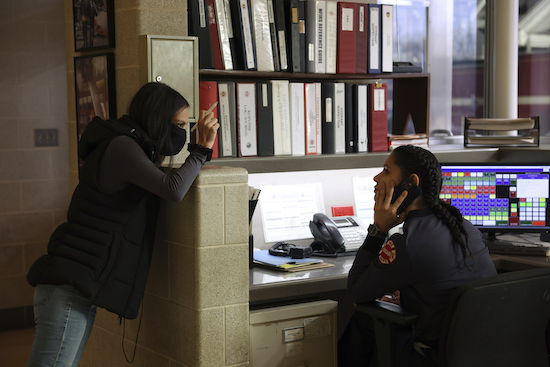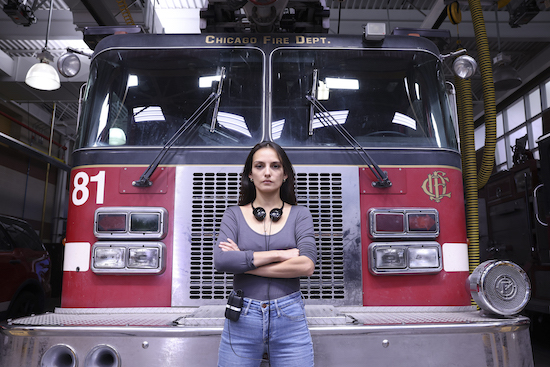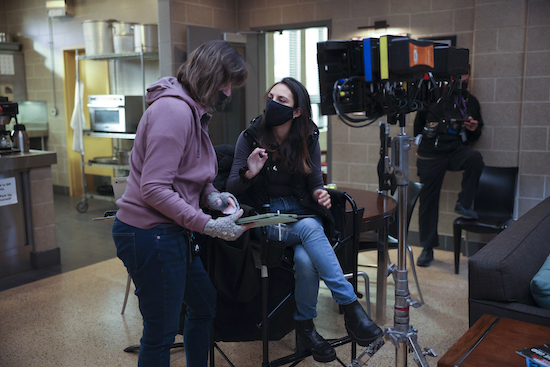CHICAGO FIRE Post-Mortem: Director Kantú Lentz Breaks Down ‘Fire Cop’
February 23, 2022 by Marisa Roffman

CHICAGO FIRE — “That Good Kind of Trouble” Episode 1013 — Pictured: (l-r) Kantu Lentz — (Photo by: Adrian S. Burrows Sr./NBC)
[Warning: This post contains spoilers from the Wednesday, February 23 episode “Fire Cop.”]
CHICAGO FIRE’s return post-Olympics was a big hour, as Gallo (Alberto Rosende) lost—and then regained, thanks to some help from Kidd (Miranda Rae Mayo)—his mojo, Severide (Taylor Kinney) played fire cop, and Pelham (Brett Dalton) (temporarily) moved into a (maybe) cursed office.
But as big as the hour felt, there was an extra special element going on behind-the-scenes: Kantú Lentz, a graduate of NBCU’s Female Forward program, got to step behind the camera for the first time, making her television directing debut.
“I actually grew up watching the Dick Wolf shows—I probably learned a lot of English through watching LAW & ORDER: SVU in Peru,” Lentz says with a laugh. “It was a very special thing for me, a full-circle moment, to have my first episode be a Dick Wolf show.”
Of course, “Fire Cop”—and CHICAGO FIRE as a whole—is a lot for a first-time TV director to tackle. (Lentz, who is also a writer/actor, had previously directed shorts, including JACK AND JO DON’T WANT TO DIE, which is currently being developed into a feature film.) Here, she talks about her experience joining the ONE CHICAGO world…
What made you want to be a part of the Female Forward program?
It was the only program that actually offered jobs. Now, there’s a couple other programs doing it, but until—I believe—this year, it was really the only one that would offer the actual job that you need in order to move to the next level in your career.
I had applied two or three times; I can’t remember, but it was definitely on my goal list. I think when you are starting out as a director, you’re always trying to figure out—or at least hopefully you are—what’s the dream gig that you want? And for me, it’s TV directing. Every year, I would try to come up with something new, a new short film, something that I could apply to other grants, so that I could also have something new to show to Female Forward. The last time that I applied, I think I had one of the stronger pieces I’ve made so far. I made it through to the next level, and then to the next level, and [then got into] Female Forward.

CHICAGO FIRE — “That Good Kind of Trouble” Episode 1013 — Pictured: Kantu Lentz — (Photo by: Adrian S. Burrows Sr./NBC)
Was there something from the program you found particularly useful when you first stepped on set?
Shadowing, to be fully honest, when you’re starting out is super valuable. I’m hoping that moving forward—obviously not for two months, because end up shadowing for two episodes [as part of the program]—but I want to shadow more on shows that I’m hired on. Because each TV set is an ecosystem. Each set is an ecosystem, but TV sets are much more of its own ecosystem because they function before you and after you.
So it was understanding how everything works [on this particular set]: Okay, the crew really enjoys this or they work best under these circumstances or the tone of the comedy, the tone of the drama.
I shadowed the executive producer, Reza Tabrizi; he’s incredible. And so I could see how he would treat performances, to what the show is, and also his speed to what is required [and] how fast we have to move on.
To me, and this goes back to what I was telling you about Female Forward being so visionary, is that, to me, what I learned the most was doing it, because there’s only so much you can learn by reading, listening, by watching. For me, I felt like I grew so much by doing this episode by actually having to do it. The shadowing and the way that they bring you in is invaluable; I don’t think that I’ll ever have an experience like this again.
What was your biggest priority when you first got the episode and what do you think your biggest challenge might be?
For me, it was figuring out where and, not specifically to this, but what are the hills that you will die on? Like, what are you going to fight, “I’m going to need more time for this”? I don’t mean going over, but, “I’ll pick up later, we need to spend more time on this; this is important.” And figure out what are those moments in which you can go, “I know I can get this in two setups.” Not that the scene isn’t important, but that scene can be told in that way. It had a lot of action. I mean, it had a big house fire, it had a great investigation storyline.
And it was interesting, because I have watched all of CHICAGO FIRE in preparation for my episode: the incidents always have some type of element of something that the firefighters need to work out, emotionally, either with each other or with themselves. And this incident actually had almost all storylines, because it has Severide, it’s the first time he meets Julia, the young girl that he’s going to help out. We see Kidd stepping up to truly be the lieutenant type that she’s going to be by saving Gallo. We have Gallo sort of overstepping and putting himself in harm’s way. It has every single storyline in the incident.
To me, it was important that I made sure that I set up each of those storylines at the incident. What was interesting is that due to COVID, we had to push the incident towards the end of the episode; we were supposed to shoot it on the second day, but obviously because of COVID this was an episode that that we had to shoot over a long amount of time.
But I think what made it great is the people that work on CHICAGO FIRE. I’m so lucky that I got to collaborate [with them]…[stunt coordinator] Rick LeFevour is legendary. John Milinac, who does practical effects, also is legendary. The fact that I get to collaborate with people like that elevates my abilities in an unspeakable way.
You had a big fire to contend with in your episode. What can you kind of share about the particulars of directing that kind stunt work and its physicality, especially couched within your first hour of episodic television?
I think it’s being specific and knowing what you’re going to do. Because on the specifically on the fire stage, everything that you’re going to see indoors with Gallo is shot on the lot, on a set that they’ve built for you to burn down with real, live fire. There might be some extra post stuff added, but for the most part, that is a real fire that the actor and the stunts are going through.
So I would say [it was about] having your overheads, know exactly what the blocking is going to be, both physically and emotionally, because you can’t be running in on a live stage and giving notes. Also, you’re most probably going to get one take of each of those setups, right. So you’re usually setting up for one hour, because you rehearse it physically with the actor. Then you do a camera rehearsal, and you see, “Okay, I’m going to see these two walls here.” And then, knowing what you will see in your box, you now start setting levels on the fire. Because if you don’t see them, there’s no reason to have a lot of fire that you’re not going to see. Then you set levels now without the actor. So, basically, you have to have the ability to put all of those pieces together before starting to actually shoot it. You have to be able to make tweaks on separate pieces, because that’s very hard as a director—you’re not even in there. It’s your actor. It’s the stunt [team]. It’s the camera crew. And I think it’s very important that you also make sure that you’re not making them do anything extra because you didn’t think, “Oh no, I wanted it like this.”
The joke is to never work with kids or animals, but your episode, technically, had both, too. How was it trying to direct that cat?
She was great. She was a star. She actually flew out and then the shoot got canceled, which is funny to me to think of a cat that had flown for its big day. I mean, here’s the thing: I’ve worked with children a lot in my own work. I’m also like 5’1, so we get along; I love working with kid actors. And these two, they were both young adults.
Working with the cat honestly was, it was so fast; that cat was a pro. That cat knew what it was doing. But yeah, it was basically we had to shoot the scene [with the actors] on its own. And then on the set, we built with a green screen, Craig Jackson, who’s, again, another genius, basically found branches from I don’t know how many trees and recreated that little branch area that the cat was supposed to be sitting on. And then I think we got it in—and I feel like it sounds insane—but we got it in just like 15 minutes from sitting the cat there and being [still]. It didn’t move that much and it looked around. But I think it’s also the trainer that CHICAGO FIRE works with. She was very attentive to the cat, making sure that it was always getting treats in between takes, so that it was always very happy.
There was a funny moment that I took a video of where the real cat is in its cage, looking at the fake cat on the green screen. And I thought that was the funniest thing. I was wondering what it was thinking.
I’ve always had cats, so I was very excited. And I also got to work with Tuesday [the dog], which is great. Again, it’s the same animal trainer, who is incredibly protective of her animals, which is why the animals are always really great: because they feel safe with her. I mean, listen, I don’t know anything about animal training, but she really takes care and makes sure that they’re feeling good.
In addition to the fire elements, you also made your TV directorial debut in the midst of COVID restrictions. How do you think that will impact how you approach things going forward?
I look at a set both—my personal sets or like sets for hire—[and] I’m just saying it’s gonna be so much easier and people are gonna really enjoy themselves so much more once we can connect [again]. Because it is hard to connect with actors with a mask on or shield. So much of it is reading the minuscule in-between moments when you’re directing. Even for them to see [reactions] on your face, at least for me. I do come from a background of acting, so I put a lot of importance on connecting with the actors. I am also very protective of actors that I work with. And so, yes, I wish it hadn’t been a pandemic and I could have hung out with them a little bit more if that was a possibility or get to know them…Those are definitely all [things], but at the end of the day, for me, I still was getting to do my first episode.

CHICAGO FIRE — “That Good Kind of Trouble” Episode 1013 — Pictured: Kantu Lentz — (Photo by: Adrian S. Burrows Sr./NBC)
Is there anything else you’d like to share about your experience at CHICAGO FIRE?
I wanted to go back to basically the mentoring that Female Forward provides. The amount of care that Reza Tabrizi , and also, specifically, Lisa Wiegand, the DP of the show, took on top of the 1000 spinning plates they have going, they still take on the job of bringing in someone and teaching them the ropes of, yes, a very complicated show to direct as a first-time TV director. I think that’s something that should be mentioned, because both of them were incredible mentors to me.
What Female Forward provides is also the shows that they have in their library, that [those] shows will set you up for a career. And it’s not only the type of show that I got to do, which is, right, I got to do action. And I got to do incredible action because usually I make my own shorts. I can’t afford to make something of that [grand scale]. But now I have that. I have the experience of working in that and the sample. I have great drama, I have great comedy, with all of this stunts.
But having two mentors like Reza Tabrizi and Lisa Wiegand guide me through the two months that I was shadowing so that I could attack this episode and be successful at it is something that also, I hope, continues. And I know everyone is great. I just was so impressed by their ability, on top of [everything] to have the bandwidth to teach and mentor. I think that’s very rare. Because also, people can be great artists, but they don’t necessarily have to be great mentors. These people, both Reza and Lisa, were doing a million things on top of mentoring—during a pandemic.
CHICAGO FIRE, Wednesdays, 9/8c, NBC
RELATED:
- CHICAGO FIRE: ‘Fire Cop’ Photos
- CHICAGO FIRE: ‘Show of Force’ Photos
- CHICAGO FIRE: ‘Fog of War’ Photos
- CHICAGO FIRE: ‘Back with A Bang’ Photos
- CHICAGO FIRE Post-Mortem: Derek Haas on Kidd’s Return and What it Means for Firehouse 51
- CHICAGO FIRE: ‘Winterfest’ Photos
- CHICAGO FIRE: Derek Haas Teases Kidd’s Return, Brett’s Big Presentation, and Christmas Cheer Going Awry
- NBC Boss Teases Potential LAW & ORDER and ONE CHICAGO Crossovers
- CHICAGO FIRE: ‘What Happened At Whiskey Point?’ Photos
- CHICAGO FIRE: ‘Whom Shall I Fear?’ Photos
- CHICAGO FIRE: ‘Dead Zone’ Photos
- CHICAGO FIRE Boss Derek Haas on the New Leader of Truck 81 and When Casey Might Return
- CHICAGO FIRE Stars Tease Episode 200: ‘Brace Yourself’
- CHICAGO FIRE Post-Mortem: Derek Haas on the Season 10 Premiere Reveals, ‘Big Changes’ Ahead for a New Couple, and More
- CHICAGO FIRE: Derek Haas Previews Stellaride Post-Engagement, Brettsey’s Interrupted Conversation, and More
- CHICAGO FIRE: Jesse Spencer and Kara Killmer on Brettsey’s ‘Self-Sacrificing’ Dynamic
- CHICAGO FIRE Post-Mortem: Derek Haas Breaks Down the Wildly Ambitious ‘My Lucky Day’
- Daily Dose of Joy: ONE CHICAGO Stars Play Trivia for Charity
- NBC Renews ONE CHICAGO Trio for 3 Seasons
- CHICAGO FIRE Boss on Highlighting Firefighter Cancer Support Network
- Dick Wolf on What He’s Learned About Expanding Television Franchises
- ONE CHICAGO Stars on the Cut Crossover Ending
- CHICAGO FIRE’s David Eigenberg & Christian Stolte Crash Eamonn Walker & Jesse Spencer’s Interview
- CHICAGO FIRE: Taylor Kinney and Miranda Rae Mayo on Severide and Stella’s Relationship
Follow @GiveMeMyRemote and @marisaroffman on Twitter for the latest TV news. Connect with other TV fans on GIVE ME MY REMOTE’s official Facebook page.
And be the first to see our exclusive videos by subscribing to our YouTube channel.
As an Amazon Associate we earn from qualifying purchases made through links/ads placed on the site.
Related Posts
Filed under Chicago Fire
Comments Off on CHICAGO FIRE Post-Mortem: Director Kantú Lentz Breaks Down ‘Fire Cop’



Comments